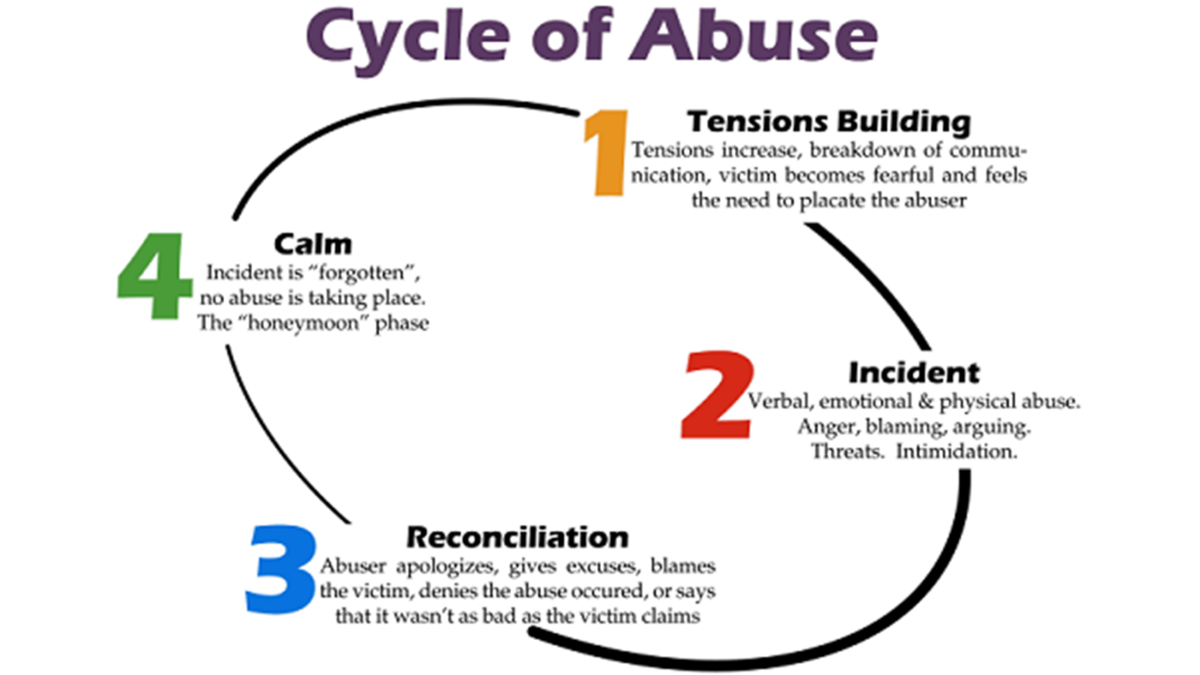cycle
ˈsʌɪk(ə)l/
noun
a series of events that are regularly repeated in the same order.— —
In 1979, Lenore E. Walker coined the term ‘The Cycle of Abuse’. This is a theory that proposes that abusive relationships often follow a similar pattern.
Obviously, all relationships are unique to each couple involved so this theory will pan out differently from one abusive relationship to the next.
In a nutshell there are three main stages which make up the theory:
- Tension building phase
- Acute explosion
- Honeymoon stage

It’s really important to be aware that these stages don’t follow a particular timeframe. They can happen over days, weeks, months and the phases can also last an indeterminate length of time.
So, what might these different stages look like? Let’s use the image of a pressure cooker:
Tension building
Think of this stage as a pressure cooker that is near to boiling.
Issues start to arise, for example arguments about finances, housework and employment. Your spouse may have become verbally abusive and maybe you tried to placate him by attempting to gloss over the abuse. You might have been compliant, you might have tried to nurture him.
Excuses were made for his behaviour, often by both parties.
Sometimes people refer to this stage as ‘like walking on eggs shells’ with a feeling of dread and a knot in your stomach.
It’s important to note that there will of course be tension in healthy relationships but what distinguishes this from unhealthy abusive relationships is how the tension is resolved.
Could you sit down and talk about how you were feeling or were you in a relationship that was swiftly moving to stage two of the cycle?
Acute explosion
This is the point where the pressure cooker boils over.
There was an explosion which may have culminated in physical violence.
There may have been no way of rationalising his behaviour and it could even have been something external to the relationship that lead to the explosion.
At this point you may have left, you may have called the police or you may have tried to keep the peace.
However, what you both knew deep down is that this explosion was going to lead on to the third stage of the cycle, as he tries to pull you back into the relationship once again.
Honeymoon
Let’s look at this in terms of our pressure cooker analogy, once the pressure cooker is opened you may realise that most of the food is inedible, because it has been spoiled by the pressure cooker exploding. However, there are some parts, if you dig around, which are actually quite edible and compared to the bad are quite good.
Generally, we have the honeymoon stage at the beginning of a relationship and unfortunately it also comes around time and time again in The Cycle of Abuse.
It’s the part of the relationship that we lived for because all seemed good in the world again; it reminded us of what we had.
You probably felt happy, relieved, you might have returned to him if you had left the relationship.
Our partner becomes the man we fell in love with once again. He was sorry for what he had done, he promised never to do it again, he only exploded because of your behaviour towards him. Have you heard any of these before?
The worst part about this third stage is that inevitably it ends as the cycle begins all over again.
It is vital to remember that your partner, having perpetrated abuse towards you, was no reflection on your behaviour; it was not your fault. Unfortunately, it was him choosing to behave in a certain way and directing it at you. He could control his actions, sadly he chose not to.
Isaiah 61 has helped me in some of my darkest periods of life. It talks about the year of the Lord’s favour, proclaiming freedom for the captives, release from darkness for prisoners, comfort for all who mourn and a crown of beauty instead of ashes. This is God’s will for our life!
In The Voyage of the Dawn Treader by C.S. Lewis, as their ship is sailing into the darkness, Lucy cries out to Aslan for help. The words that she hears whispered, and feels are from Aslan, are ‘courage, dear heart’. In the darkness, she knows that a light is coming.
It takes huge courage to separate yourself from an abusive partner and to finally leave a cycle of abuse. Women go back numerous times before finally leaving but this is not a sign of weakness, there are so many obstacles to overcome (some I’ve mentioned above) before finally being able to leave.
God does not ask us to sit it out and suffer in silence. God is a good God, a father who hates it when we are in pain, a dad who came that we should have life, and life to the full (John 10:10).

